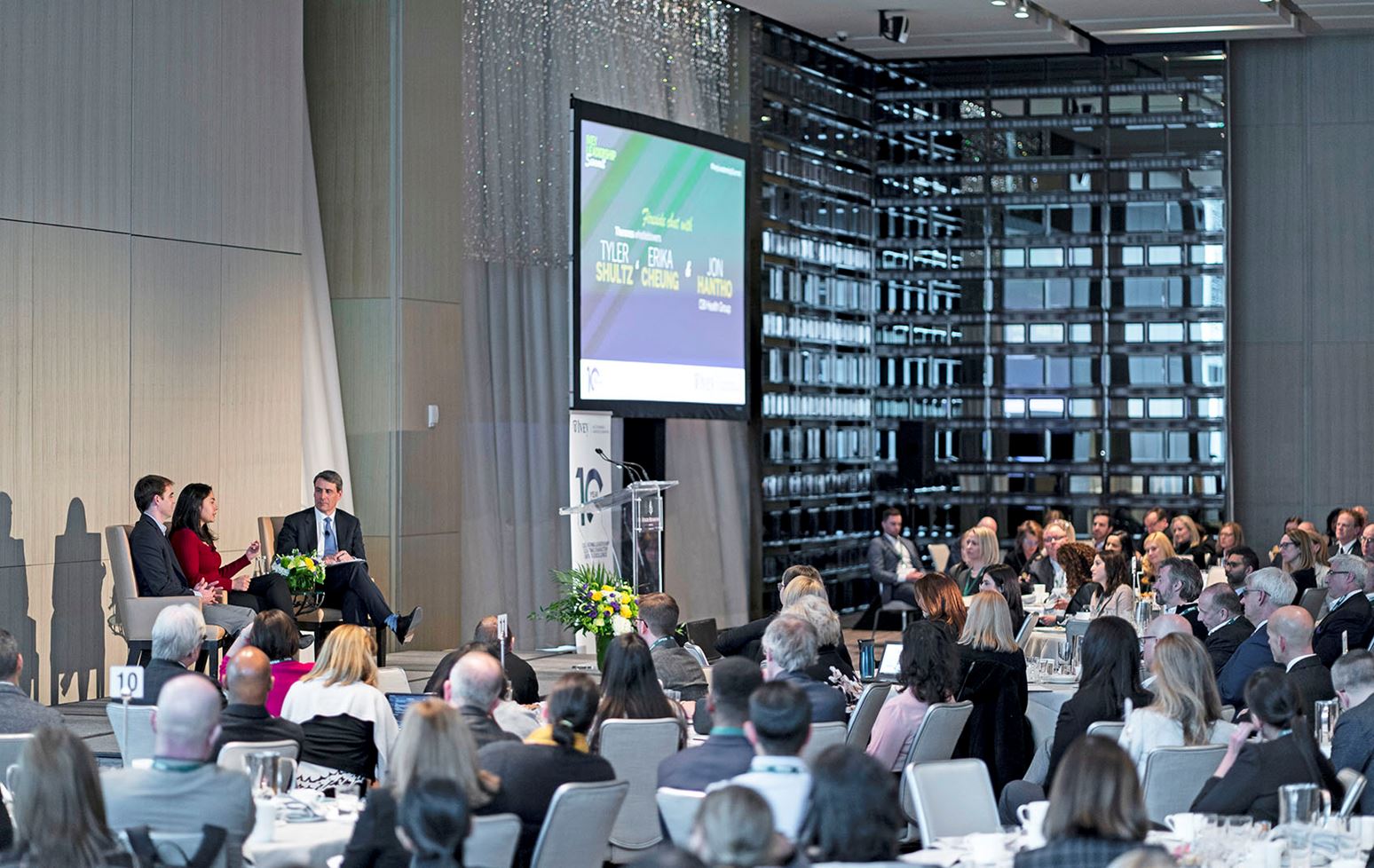 Bill Furlong is a Senior Financial Services Executive who recently retired as a Commissioner at the Ontario Securities Commission. He is an Executive-in-Residence and a member of the Leadership Council for the Ian O. Ihnatowycz Institute for Leadership.
Bill Furlong is a Senior Financial Services Executive who recently retired as a Commissioner at the Ontario Securities Commission. He is an Executive-in-Residence and a member of the Leadership Council for the Ian O. Ihnatowycz Institute for Leadership.
“Great leaders are made!” So stated Ivey Business School Dean Sharon Hodgson in her closing remarks at the sold-out Ivey Leadership Summit held at the Four Seasons Hotel in Toronto on February 28, 2020. The Summit was celebrating the 10th Anniversary since the founding of the Ian O. Ihnatowycz Institute for Leadership (the “Institute”), one of the world’s pre-eminent centers for the research, teaching and outreach on leader character.
The first two sessions of the day demonstrated the necessity and power of character to achieving sustained excellence. Michael Friisdahl, President and CEO of Maple Leaf Sports and Entertainment (MLSE), shared his journey from a small family business entrepreneur in Vancouver to leading one of the world’s largest, most complex, and most successful professional sports and entertainment franchises. Although not formalized through education, Friisdahl is a master of leadership. Over the course of his career, he carefully observed and reflected upon his own leadership practices and those of others, then often learned what truly worked through trial and error. His hard-won lessons and resolute character were clearly observable– most notably dimensions of humility, humanity, drive and collaboration – throughout his session, as was his commitment to having a diverse leadership team at the helm of MLSE and tackling the issue of unconscious bias. Friisdahl shared, “A significant portion of our leadership are female and other diverse groups of individuals. We get better output, different perspectives. We couldn’t have done that with guys chatting amongst themselves.”
Like Friisdahl, Cheryl Pounder, a Canadian Gold Medallist in women’s ice hockey in both the 2002 and 2006 Olympic Games, earned her leadership character through observation and reflection, trial and error; and in her case through the furnace of intense team competition, pinnacling twice in the crucible of Olympic Gold Medal games. Pounder shared her journey, the highs and the lows, and the character dimensions she needed to rely upon, develop, and strengthen to triumph with her teammates on the world’s greatest stage. What made Pounder’s session so compelling was how she distilled the lessons she gained from the elite experience of playing in the Olympics to make them completely relatable to a wider business audience. She highlighted aspects like dealing with pressure, the value of a mentor, rising up after failure, digging deep and working hard, and the significance of the team and not the leader to creating a winning culture. However, while her lessons learned can be broadly applied, she did concede that no matter the arena “excellence is abnormal, so we must behave abnormally to be excellent.”
The next session illustrated the human and organizational tragedy that will unfold when leader character is absent. Erika Cheung and Tyler Schultz were the key whistleblowers most responsible for uncovering the systematic, massive, and life-threatening fraud at Theranos. Cheung and Schultz detailed the circumstances that led to their employment at Theranos, and their short and tumultuous journey to detecting, attempting to correct, and finally exposing the bold and unscrupulous behaviours of Theranos’ founders and its most senior executives. Much of their session was a cautionary tale – of leadership and leader character gone wrong: transcendence became tunnel vision, courage became recklessness, drive became obsession and, as a consequence, integrity, accountability, collaboration and justice were lost. On the flipside, what was perhaps most remarkable about both Cheung and Schultz themselves, is that they were very junior employees with few, if any, direct reports. They clearly demonstrated that leadership character has little to do with the position to lead, but rather the disposition to lead. Their courageous and inspiring judgments and actions came with great personal risk and cost, and we are obliged to honour, emulate and share their story.
Keynote speaker Anna Maria Tremonti is a much beloved and globally respected Canadian journalist who has covered events and interviewed people in some of the world’s most dangerous and complicated locales. For over three decades, Tremonti sought out the truth to share with her listeners, sometimes at great personal risk. Throughout her extraordinary career she met some of the world’s greatest leaders, and many more who were relatively unknown. From that deep repertoire, Tremonti crafted her address for the Summit by extracting the stories of a small group of individuals that provided insight into their character and how it was integral to their leadership or their success. Perhaps most inspiring was the story of Nice Nailantei Leng’ete, a Masai human rights activist advocating to stop the practice of female genital mutilation (FGM). By the age of eight, she had begun advocating for both herself and other young girls to find alternate rites of passage for cultures that have historically practiced FGM. Today, Leng’ete is credited with saving an estimated 15,000 girls from undergoing this procedure, and Tremonti believes she is just getting started. Tremonti shared "She had the courage to stand up and change her fate, and then used the resulting empowerment to fight for others."
The final session of the day featured a conversation between Ivey Professor Mary Crossan and Steve Virgin, former Submarine Commander and Deputy Head of Canada’s Special Forces, who is now engaged in the unique and ground-breaking role as Director, Character Leadership at the Canada Revenue Agency (CRA). Together they described the corporate processes necessary to embed character-based leadership into the CRA, a 40,000-person strong federal government. Crossan and Virgin focussed on how the introduction of leader character at the CRA has created insight, enthusiasm and even gratitude across the organization’s workforce. Virgin described their deliberate, thoughtful approach that has led to a desire for more engagement, and an almost overwhelming demand for his burgeoning team’s services. And perhaps most importantly, Virgin noted that “it takes character to implement character.”
As the participants of the Ivey Leadership Summit have learned, and true to Dean Hodgson’s words, great leaders are not born, but made! Competencies can be learned. Commitment is a personal choice. But both rest upon and are leveraged - for better or for worse – by one’s leader character. The Ivey Leader Character framework democratizes leadership, by removing birthright and placing it into our own hands, and allowing us to choose our own destiny. By committing to the challenge of becoming aware of and developing your own leader character you can profoundly change yourself, your organization, your country, and the world. If the Ivey Leadership Summit inspires even just a handful of its participants to vigorously pursue their own leader character development (and I am sure that it will), the event will have been an extraordinary success.
